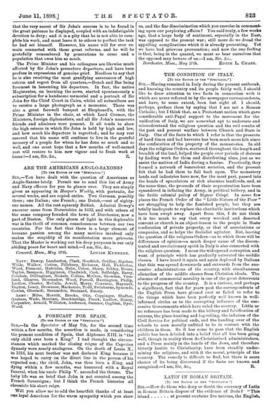THE CONDITION OF ITALY.
[To TUE EDITOR OF TEN " SPACTATOR."3
Sit,—Having remained in Italy during the present outbreak, and knowing the country and its people fairly well, I should like to draw attention to two facts in connection with it which are never referred to by the newspaper correspondents, and have, to some extent, been lost sight of. I should, perhaps, preface them by saying that I am not a Roman Catholic; but I think that, as a Protestant nation which gave considerable anti-Papal support to the movement for the unification of Italy, we are somewhat apt to underrate and misunderstand the religious question and the evil results of the past and present warfare between Church and State in Italy. One of the facts to which I refer is that the pressure of hard times and bad harvests has been much more felt since the confiscation of the property of the monasteries. In old days the religions Orders, scattered throughout the length and breadth of the land, helped the people over periods of distress by finding work for them and distributing alms, just as we assist the natives of India during a famine. Practically, they formed a network of benevolent societies, and the peasant felt that he had them to fall back upon. The monastery lands and industries have now, for the most part, passed into the hands of speculators or rich absentee landlords, and, at the same time, the proceeds of their sequestration have been squandered in inflating the Army, in political bribery, and in the futile colonial policy of Signor Crispi. In some few places the French Order of the "Little Sisters of the Poor" are struggling to help the famished people, but they are totally inadequate to replace the charitable institutions which have been swept away. Apart from this, I do not think it is too much to say that every wrecked and deserted convent or church is an object-lesson to the people in State confiscation of private property, or that of associations or companies, and so helps the Socialist agitator. Bat, leaving the question of the religions Orders—as to which there will be differences of opinion—a much deeper cause of the discon- tented and revolutionary spirit in Italy is also connected with the religious question. I mean the widespread corruption and want of principle which has gradually saturated the middle classes. I have heard it again and again deplored by Italians that this was spread downwards and outwards from the suc- cessive administrations of the country, with simultaneous alienation of the middle classes from Christian ideals. The absence of commercial morality is one of the great deterrents to the progress of the country. It is a curious, and perhaps a significant, fact that for years past the correspondents of the English Press have glossed over or failed to refer to the things which have been perfectly well known in well- informed circles as to the corrupting influence of the suc- cessive Governments which have ruled the country. Little or no reference has been made to the bribery and falsification of returns, the place-hunting and log-rolling, the inflation of the Civil Service for political ends, and the handing over of the schools to men morally unfitted to be in contact with the children in them. So it has come to pass that the English public has been deluded into a belief that all has been going well, though in reality these de-Christianised administrators, and a Press mainly in the hands of the Jews, and therefore bitterly hostile to Christianity, have been steadily under- mining the religious, and with it the moral, principle of the country. The remedy is difficult to find, but there is more chance of its being discovered if the facts are known and






































 Previous page
Previous page